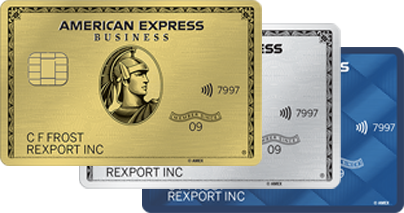
Business vs Corporate Credit Cards: What’s the Difference?
By Megan Doyle | American Express® Freelance Contributor
6 Min Read | May 11, 2022
Summary
Business credit cards and corporate credit cards are both great short-term business financing options. Not only do they provide companies – and their employees – with quick access to capital, but they also generally offer rewards programs, perks, and other benefits like expense management tools. However, not all businesses are eligible for corporate cards, and each business card type has its own unique requirements. Understanding the differences between business credit cards and corporate credit cards can help business owners understand which card type is right for their needs

What Is a Business Credit Card?
A business credit card is a credit card that allows business owners or authorized employees to pay for company expenses, from office supplies and utility bills to travel and dining expenditures. Business credit cards usually allow cardholders to earn points or cash back rewards for eligible purchases. They work similarly to personal credit cards, but lenders typically offer higher credit limits and more lucrative rewards because businesses tend to spend more.
Who is a Business Credit Card for?
Business credit cards are available for companies of all ages, employee sizes, and revenues. This includes sole proprietors, gig workers, and freelancers. The application process is generally straightforward but does require a credit check and proof of business ownership. Business credit cards also usually require a personal guarantee, meaning the business owner is liable for all debt even if the business goes under. Thus, additional card members usually aren’t subject to a credit check.
What are the Benefits of a Business Credit Card?
Responsible business credit card use can help companies build a business credit profile that will be useful for future borrowing. To help stay on top of spending, some business credit card issuers provide integration with accounting software, and account owners can typically set spending limits on employee cards. To learn more about business credit cards, read “What Is a Business Credit Card and How Does it Work?”
What Is a Corporate Credit Card?
While even small start-ups can obtain a business credit card, corporate credit cards are generally designed for businesses with higher annual revenues, usually over $4 million. Corporate credit cards allow more authorized employee cardholders than business credit cards, and card issuers may even require that a minimum number of employees hold corporate cards.
Who is a Corporate Credit Card for?
Eligibility requirements are many and strict compared to business credit cards. As the name implies, corporate credit cards are only available to S-Corporations, C-corporations, and some LLCs with an already established healthy credit history. Lenders generally expect a minimum spending threshold, and liability typically falls on the corporation instead of the business owner. This means that if the company goes under without having paid its bills, the business owner is not held responsible.
What are the Benefits of a Corporate Credit Card?
Though corporate credit card annual fees are usually higher than business credit cards, they typically offer more robust administrative benefits, such as automated expense reporting features that minimize the burden of manual expense reports and receipt reconciliation. Corporate card programs might also include features like automated bill payment services and real-time spending alerts. Management can usually set spending limits for each employee cardholder and limit spending to specific categories.
Like business credit cards, corporate cards usually offer rewards, whether in the form of points or cash back. Rewards can often be reinvested in employees or the business, depending on the card issuer.

What Is the Difference Between a Corporate and a Business Credit Card?
The main differences between corporate and business credit cards lie in eligibility, liability, and features, as detailed in the following table:
| Business Credit Cards | Corporate Credit Cards |
| Eligibility | |
| Available to all business types, including sole proprietors and gig workers. | Available only to corporations: C-Corp, S-Corp, and some LLCs. |
| Usually no minimum annual revenue, number of employees, or spending threshold requirements. | Corporations typically need to meet or exceed about $4 million in annual revenue, have a minimum number of employee cardholders, and meet a spending quota. |
| Liability | |
| Business owner offers a personal guarantee and is held responsible for all debt. | Personal liability for company owner isn’t required. |
| Credit check is performed solely on the business owner and not on additional authorized members. | Possibility for shared liability with employee cardholders. If so, employees may be subject to credit checks. |
| The main holder of the account is held liable for all debt. | Employees may be held responsible for unauthorized or personal spending. |
| Features | |
| Spending limits can be set on each authorized card, but there may not be a way to restrict spending categories. | Spending limits and spending category restrictions can usually be set for each individual cardholder. |
| Expense tracking and reporting tools are typically basic, if available at all. | Robust administrative capabilities, including automated expense tracking capabilities, real-time spending alerts, and more. |
| Usually can integrate with accounting software. | Usually can integrate with accounting software. |
| Usually offer rewards and perks like points or cash back, travel benefits, and more. | Usually offer rewards and perks like points or cash back, travel benefits, and more. |

You know what your business needs
Give it the spending power it's been looking for.
Is a Business Credit Card or Corporate Credit Card Right for My Business?
Because of the fewer requirements, business credit cards are often the only option for new or small businesses. Businesses are usually only eligible for corporate credit cards if they meet the strict set of requirements. While different credit card issuers may have different criteria for corporate card eligibility, some requirements are universal:
Business type.
Corporate credit cards are for corporations – C-Corp, S-Corp, and some eligible LLCs.
Company size.
Annual revenue eligibility usually starts at $4 million. Some issuers also require companies to have a minimum of 15 employee cardholders, for example.
Expected activity.
Some credit card issuers require a minimum expected spending quota to approve a business for a corporate credit card.
Once eligibility is confirmed, deciding whether corporate credit cards are indeed the right option can depend on some additional factors, such as:
Number of employees.
Too many authorized users on a business card may make it harder to track and verify expenses. If that's the case, the business might make good use of corporate credit card features like setting spending limits and categories.
High volume of transactions.
Similarly, a high volume of manually reported transactions may compromise expense tracking accuracy. Corporate credit cards usually offer electronic expense filing, which can reduce time and cost in expense management.
Spending limit is reached or almost reached every month.
While you may be able to raise your business credit card’s limit as your business grows, this can be a clear indication that the company is ready to scale up to a corporate credit card.






